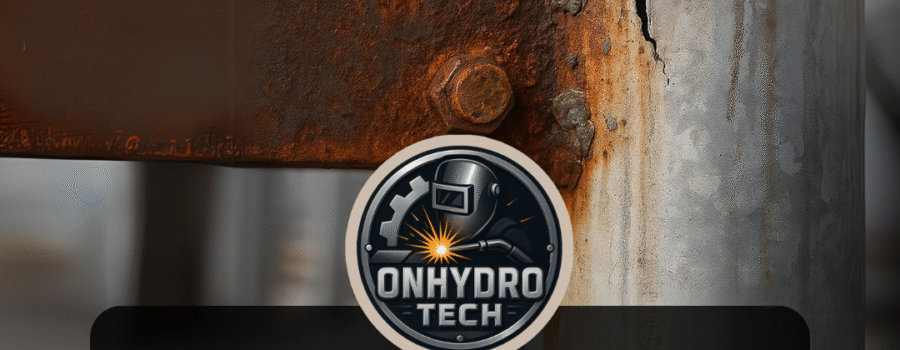Metal fatigue and weld failure are two of the most common causes of structural and mechanical compromise in commercial and industrial environments. Though not always visible to the untrained eye, these issues pose significant risks to safety, regulatory compliance, and operational efficiency. When left unaddressed, weld degradation and metal fatigue can lead to catastrophic failure—impacting equipment integrity, structural stability, and legal liability. Onhydro Tech Inc., located in Cambridge, Ontario, provides certified mobile welding and structural repair services to identify and remediate these hazards before they escalate.
Understanding Metal Fatigue
Metal fatigue is the progressive weakening of a material caused by repeated cyclic loading, which leads to microscopic cracks and, eventually, complete structural failure. Fatigue occurs even when stress levels remain below the material’s ultimate tensile strength. This makes it particularly dangerous, as components may appear intact while undergoing internal degradation.
In structural and equipment applications, fatigue is most often seen in areas exposed to vibration, fluctuating pressures, thermal cycling, or repeated impact. Welded joints, support beams, piping systems, and mechanical components are all susceptible, especially when not maintained or inspected regularly.
The Role of Welding in Fatigue Failures
Welded joints are often the first points of failure when fatigue is present. This is due to stress concentrations at the toe of the weld, heat-affected zones, and inconsistencies in material strength. Poor welding practices—including improper penetration, porosity, or undercutting—further increase the risk of crack propagation.
In Ontario, welds used in structural or load-bearing applications must conform to CSA W59 standards and be performed by CWB-certified technicians. Onhydro Tech’s welding personnel operate under these standards, ensuring that each repair or installation meets or exceeds legal and engineering requirements.
Warning Signs of Fatigue and Weld Failure
Early identification of weld fatigue can prevent safety hazards, unplanned downtime, and costly remediation. Common warning signs include:
- Visible cracks or fractures at weld joints or along metal surfaces
- Deformation or warping of components under normal loading
- Corrosion or rust streaks emerging from welds, suggesting moisture intrusion or material breakdown
- Unusual vibrations or noises during equipment operation
- Loose fasteners or misaligned components, which may result from compromised structural connections
These symptoms should not be ignored. In many cases, small cracks may not be evident until they have reached a critical stage—making professional inspection essential.
Legal and Safety Implications
Failing to address metal fatigue and weld failure is a direct violation of several provisions under Ontario’s Occupational Health and Safety Act (OHSA). Employers and property owners have a legal obligation to maintain safe working environments and must take “every precaution reasonable in the circumstances” to protect workers from foreseeable hazards.
A failed weld or compromised component that leads to injury or structural collapse may result in prosecution, civil litigation, and significant financial penalties. Insurance claims can also be denied if negligence in maintenance is proven.
Timely repair by a qualified contractor such as Onhydro Tech not only preserves safety but also demonstrates compliance with legal and contractual obligations.
Preventative Measures and Professional Repair
Preventative maintenance is the most effective strategy for combating metal fatigue and weld failure. This includes scheduled inspections, load monitoring, and professional non-destructive testing (NDT). When damage is detected, immediate corrective welding or component replacement should be performed by certified professionals.
Onhydro Tech offers mobile welding and emergency response services across Cambridge, Kitchener, and Waterloo. With engineering oversight and certified execution, repairs are performed to code, on-site, and without unnecessary delay.
To arrange an inspection or emergency welding repair, contact Onhydro Tech Inc. at 647-248-6682 or visit onhydrotech.ca. Identifying the signs early can prevent substantial loss—and keep your operation safe and compliant.

